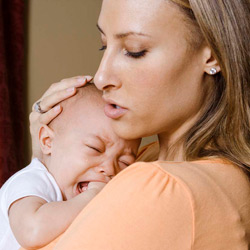
Breastfeeding can help mothers relax and handle stress better. Skin-to-skin contact with your baby has a soothing effect.
Handling stress
Both short and long-term stress can affect your body. In fact, stress can make us more likely to get sick. It can also make problems we already have worse. It can play a part in a range of issues, including trouble sleeping, stomach problems, headaches, and mental health conditions.
Having a new baby and learning how to breastfeed can be very stressful events. But it is important for mothers to take care of themselves. Try to listen to your body so that you can tell when stress is affecting your health, and take these steps to feel better!
- Get help from a professional if you need it – A therapist can help you work through stress and find better ways to deal with problems. For more serious stress related disorders, like post traumatic stress disorder, therapy can be helpful. There also are medications that can help ease symptoms of depression and anxiety and help promote sleep.
- Relax – It’s important to unwind in a way that works for you. Try a bubble bath, deep breathing, yoga, meditation, and massage therapy. If you can’t do these things, take a few minutes to sit, listen to soothing music, or read a book.
- Sleep – Your stress could get worse if you don’t get enough sleep. It is hard to fight off illness when you sleep poorly. With enough sleep, it is easier to cope with challenges and stay healthy. Try to get seven to nine hours of sleep every night. If you can’t, try to sleep when the baby sleeps.
- Eat right – Try to fuel up with fruits, vegetables, proteins, and whole grains. Visit the Nutrition and fitness section for more information.
- Get moving – Physical activity not only helps relieve your tense muscles, but helps your mood too! Your body makes certain chemicals, called endorphins, before and after you exercise. These relieve stress and improve your mood. If you are a new mother, ask your doctor when it is okay to start exercising.
- Talk to friends – Friends can be good listeners. Finding someone who will let you talk freely about your problems and feelings without judging you does a world of good. It also helps to hear a different point of view. Friends will remind you that you’re not alone.
- Compromise – Sometimes, it’s not always worth the stress to argue. Give in once in awhile.
- Keep a journal – Write down your thoughts. Have you ever typed an email to a friend about your lousy day and felt better afterward? Why not grab a pen and paper and write down what’s going on in your life! Keeping a journal can be a great way to get things off your chest and work through issues.
- Help others – Helping someone else can help you. Help your neighbor, or volunteer in your community.
- Get a hobby – Find something you enjoy. Make sure to give yourself time to explore your interests.
- Set limits – Figure out what you can really do. There are only so many hours in the day. Set limits with yourself and others. Don’t be afraid to say no to requests for your time and energy.
- Plan your time – Think ahead about how you’re going to spend your time. Write a to-do list. Figure out which tasks are the most important to do.
- Don’t deal with stress in unhealthy ways – This includes drinking too much alcohol, using drugs, or smoking, all of which can harm the baby. It is also unhealthy to overeat in response to stress.
More information on handling stress
Explore other publications and websites
-
Breastfeeding FAQs: Sleep — Yours and Your Baby's (Copyright © Nemours Foundation) — New moms may have concerns about where the baby should sleep at home after nursing. This publication answers frequently asked questions that moms have about sleeping habits with their new baby.
http://kidshealth.org/PageManager.jsp?lic=1&ps=104&article_set=44015
-
Breastfeeding With Confidence (Copyright © American College of Nurse-Midwives) — Many women lack the confidence to even attempt breastfeeding for fear of failure, but there are ways to overcome anxiety about breastfeeding. This publication provides resources on how to breastfeed with confidence.
http://gotmom.org/Breastfeeding-with-Confidence
-
Breastfeeding: What Every Mom Needs to Know (Copyright © Mayo Foundation) — Breastfeeding can be a great benefit to you and your baby. However, it takes hard work and practice to master breastfeeding. This publication gives breastfeeding moms advice to make breastfeeding less stressful and more rewarding.
http://www.mayoclinic.com/print/breast-feeding/PR00003
-
Newborn Care: Common-sense Strategies for Stressed-out Parents (Copyright © Mayo Foundation) — Although it is exciting to bring your newborn home, it is important to also manage the stress that comes along with it. This publication offers tips that parents can use to control unwanted fatigue and chaos.
http://www.mayoclinic.com/print/newborn/FL00107
-
Positive Thinking: Reduce Stress, Enjoy Life More (Copyright © Mayo Foundation) — Feeling stressed? This online resouce provides suggestions that can help you feel more relaxed by thinking positively.
http://www.mayoclinic.com/health/positive-thinking/SR00009
Connect with other organizations
-
La Leche League International
http://www.llli.org/
-
National Institute of Mental Health, NIH, HHS
http://www.nimh.nih.gov
-
Public Information and Communications Branch, NICHD, NIH, HHS
http://www.nichd.nih.gov
Content last updated August 1, 2010.
Resources last updated August 1, 2010.
womenshealth.gov
A federal government website managed by the Office on Women's Health in the Office of the Assistant Secretary for Health at the U.S. Department of Health and Human Services.
200 Independence Avenue, S.W. • Washington, DC 20201


 Text size
Text size Email
Email
